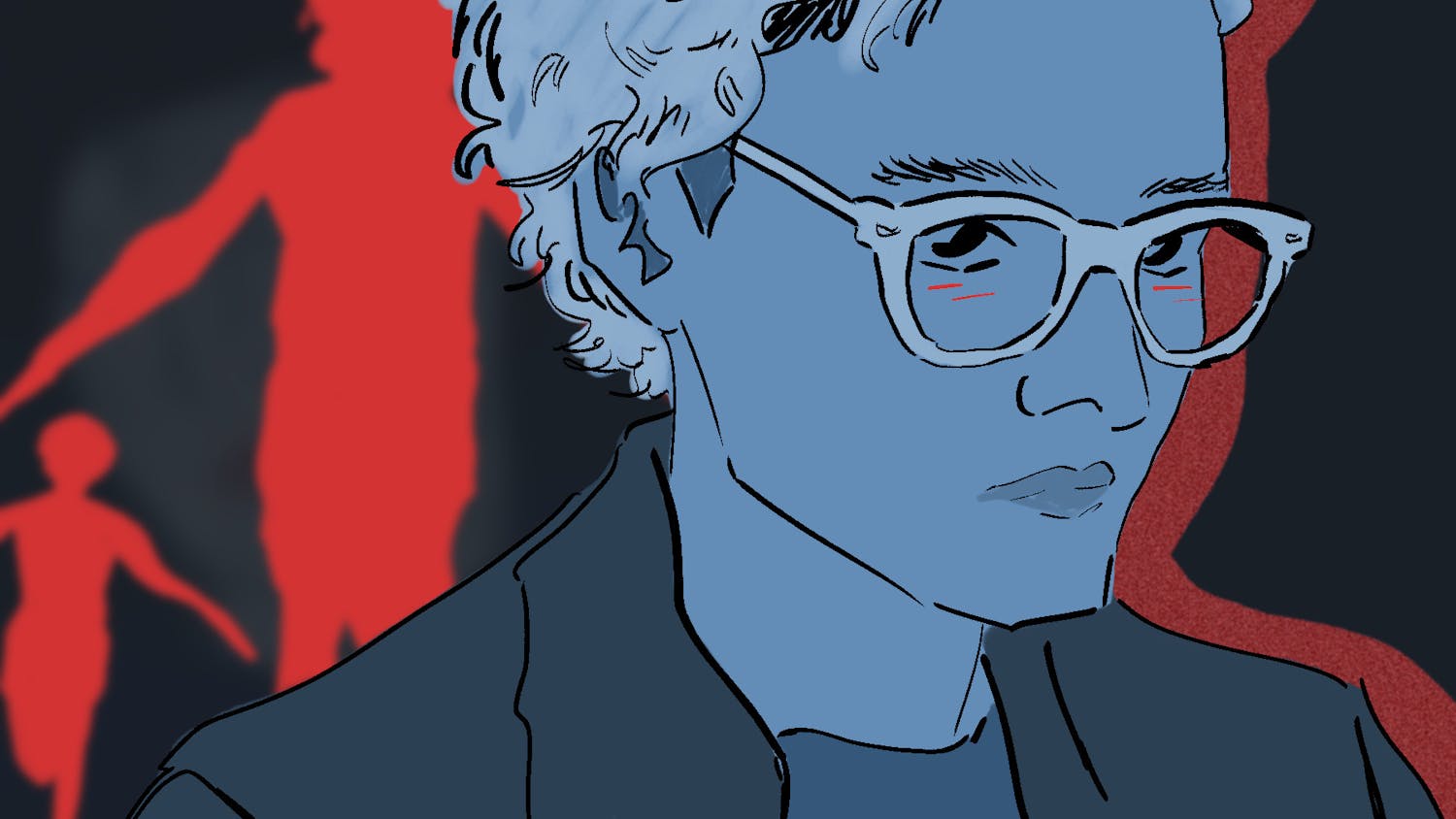Each year, Dartmouth’s theater department allows select theater majors to undertake an honors thesis. A selective process, only students who have completed at least five theater courses and who have an average major GPA of at least 3.4 or higher, along with an overall GPA of at least 3.0, are eligible to apply for the project. Those who are accepted are given the opportunity to sharpen their skills and enrich their knowledge in an area of interest through a written thesis or a full-length play. In the Class of 2018, there were four students — Claire Feuille ’18, Lela Gannon ’18, Virginia Ogden ’18 and Matthew Treiber ’18 — who presented their honors theses this spring. Senior Fellow Celeste Jennings ’18 also wrote and produced a play as part of her fellowship. Throughout the month of May, all five of the students premiered their projects in the Hopkins Center for the Arts, where they shared their works to audiences for the first time.
A Senior Fellow, Celeste Jennings ’18 underwent a less traditional route when she wrote and produced her play “Citrus” with the funding and support of Dartmouth’s Senior Fellowship program. Intended to assist students, regardless of major, who wish to take on a project of scope and breadth that “goes beyond that which can be accomplished by taking courses offered in the existing curriculum,” according to the program’s website, the fellowship opened doors for Celeste to create a truly multimodal project. After applying to be a Senior Fellow during her junior fall, she was accepted into the program that spring and began writing the play that she’d always dreamed of. Informed, in part, by a College theater course in which she had the chance to work with playwrights, Jennings was excited to try her hand at playwriting. By her senior fall, the writing that would make up “Citrus” was complete.
Inspired by the format of the choreopoem, a style of performance popularized by playwright Ntozake Shange’s “for colored girls who have considered suicide/when the rainbow is enuf,” Jennings’ work tracks the experiences and stories of Black women from the mid-nineteenth century to the present with a similar poetic choreography. Merging poetry, visual arts, costume design and audio, Jennings used theater as a medium to convey a variety of experiences and the wealth of Black women’s histories. Through trips to museums in Washington, D.C. and New York City, Jennings was able to interact with the history and art that ultimately informed her work.
In the end, she found the experience to be a process-heavy affair, requiring a lot of research, revision and time spent gathering the ideas and events she wanted to incorporate. Ultimately, however, she learned the most from her cast, who worked alongside her to make “Citrus” happen. Challenging her as a writer, cast interpretations of her work taught Jennings what it meant to maneuver as a playwright.
“As a playwright, I went on a journey to write this,” Jennings said. “The actors have to go on their own journey too.”
Over the course of the production, the all-female cast and production team, made up of women of color grew close, thanks to their chemistry and the “feedback parties” held to encourage honest communication.
“It was a space I’d never been a part of at Dartmouth,” Jennings said. “I was honored to be with them.”
Chronicling the experiences of a community in distress, Gannon wrote her original play “The Houses with Ramps,” about a decade-long battle against environmental racism in her hometown of Dallas, Texas. Using the senior project framework, Gannon was able to dedicate the time and energy necessary to tackle an issue that was close to her while building upon her theatrical education.
“I just wanted to have a culminating experience that was cumulative of all the things I’ve learned in the theater department,” she explained.
New to playwriting, the experience expanded Gannon’s outlook on theater.
“As someone who thinks of themselves primarily as an actor, I think I gained a fuller understanding of the holistic play making process,” she said. “To write a full-length play in eight weeks is a challenge.”
Per her creative process, she plans to take a break from her work to gain new perspective, but in the future, she hopes to bring it back to the community at the center of the play.
“I think it would be really great to do the play, at some point in the future, in the city where the conflict happened,” Gannon said. “In the city where the people I spoke to live.”
Engaging with a similar regional specificity in her work “She-Wolf of France,” Feuille adapted Shakespeare’s “Henry VI,” Parts I, II, III, and “Richard III” and centered the story on a recurring character deprived of the spotlight, Margaret of Anjou: Henry VI’s widow. Not unlike Gannon, Feuille sought out the honors thesis in the theater department to pursue an opportunity that would put her academic and dramatic career to the test. Having previously starred in a senior project, Feuille knew she wanted to do an honors project of her own, and that hers would help remedy the neglect of an important woman in English history.
Playing the lead role of Queen Margaret in her own adaptation, Feuille negotiated the distinctions between the role of an actress and that of an adapter. Exploring the art of adaptation, Feuille grew to appreciate revision and cutting as a kind of craft.
“I learned how to use the same text to tell the story you want to tell,” she said.
In time, Feuille found that her intimate involvement with the script and its organization came to inform her embodiment of the role.
“I’ve never been in a role that I knew so much about before doing it,” she explained.
At times, Feuille said she had to remove her adapter’s hat altogether, embracing Queen Margaret as she was.
“At some point acting has to stop being about thinking and start being about being,” she added.
While each senior produced vastly different works, spanning time, geography, subject matter and format, a line connecting the three productions lies in the recurring themes of history, resilience and struggle. Each senior pulled from the past or the present to tell a new story, taking the steps that were necessary to make these productions become a reality. As all three seniors noted, the theater department’s flexibility and capacity to support burgeoning artists was an essential element that allowed for their trailblazing works to come to fruition.
“There are certain things you just can’t do in one term, and the thesis framework can support you a lot,” Feuille said.
Taking on the issue of mental health in modern theater, Treiber used the senior thesis program to produce an honors thesis presentation entitled, “Teen Depression and Suicide in The Contemporary American Musical.” Offering an in-depth analysis of the popular Broadway musicals “Spring Awakening,” “Dear Evan Hansen” and “Heathers: The Musical,” Treiber tracked a recurring theme in American theatrical productions in order to create a dialogue regarding mental health representations.
Through the theater department, Ogden directed and choreographed a staged production of “Hair,” which premiered in the Moore Theatre in early May. Given the space and resources to bring an iconic American rock-musical to life at Dartmouth, Ogden sharpened her directorial skills with her last College production.
With the help of her thesis advisor, who pushed her to write more and meet deadlines, Gannon was able to share her 90-page play with the greater Dartmouth community. And without the additional support of the theater department, Jennings emphasized how “Citrus” may not have been possible at all.
“If they didn’t support me I do not think I would’ve been able to do this,” Jennings said. “I got everything that I needed and lots that I didn’t think I needed. I feel so whole.”



